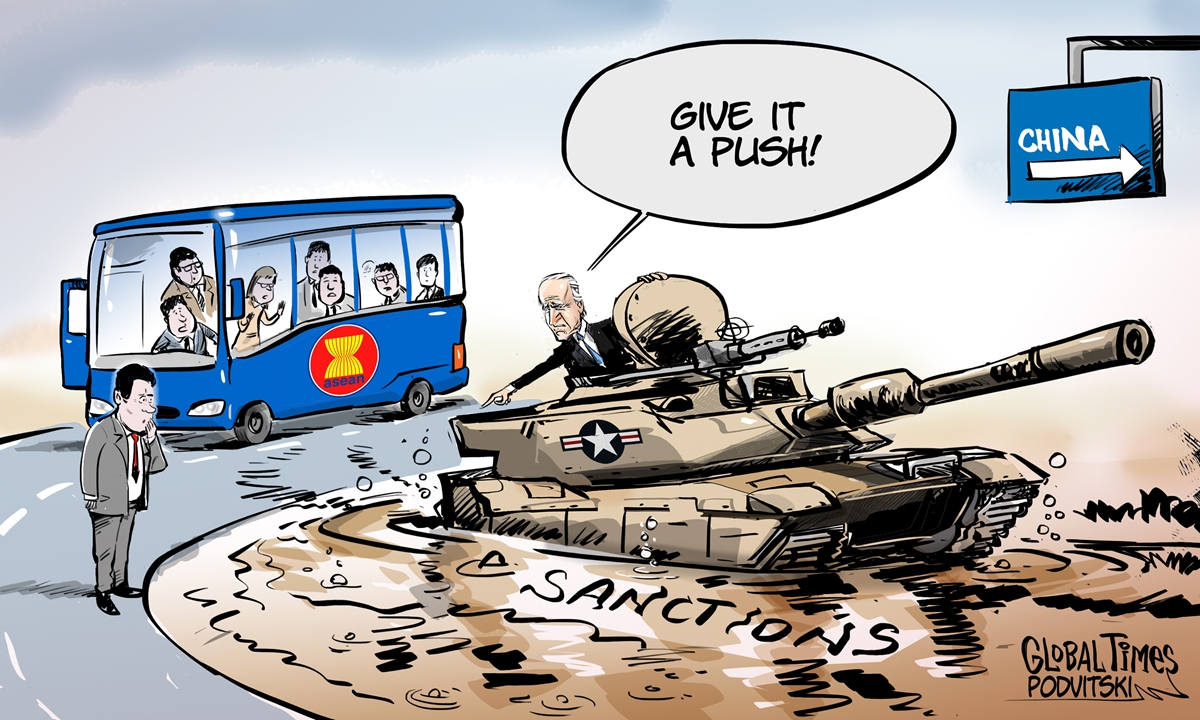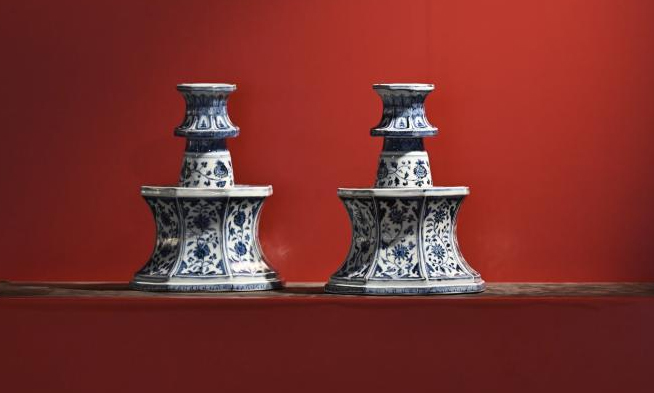ASEAN leaders call for open, integrated trade in Asia as Japan woos region over US-led IPEF

US pulling ASEAN into the quagmire of confronting China Cartoon: Vitaly Podvitsky
Tokyo hosted leaders of some of ASEAN member states to discuss the future of Asia at a forum on Thursday, after seeing off US President Joe Biden, who visited Japan for a Quad summit and carried out a mission to rope in regional countries through the newly launched Indo-Pacific Economic Framework (IPEF).
Regional leaders shared the consensus that Asia's future lies in stability, cooperation and stronger integration, and ASEAN states will continue their balanced policy to push for regional prosperity amid challenges, observers said, predicting that ASEAN is looking for opportunities in the IPEF but won't embrace the US' efforts to use the framework as a geopolitical tool.
Singaporean Prime Minister Lee Hsien Loong, Malaysian Prime Minister Sabri Yaakob, and Thai Prime Minister Prayut Chan-o-cha are in Tokyo for the forum and bilateral talks with Japanese Prime Minister Fumio Kishida.
Other leaders, including Cambodian Prime Minister Hun Sen and Bangladeshi Prime Minister Sheikh Hasina are also attending this year's forum called "Redefining Asia's Role in a Divided World," where Kishida is expected to lobby ASEAN over the IPEF, the US-led framework widely believed to aim at marginalizing China's economic influence in the region.
A Japanese government opinion poll released before the forum on Wednesday showed nearly half of those surveyed in Southeast Asia picked China as the region's most important partner in the future, surpassing Japan for the first time.
Kyodo News cited a Japanese foreign ministry official as saying China had deepened ties with ASEAN through "vaccine diplomacy."
But vaccine aid and medical supplies provided during the COVID-19 pandemic constituted just one facet of the comprehensive and fruitful China-ASEAN cooperation, which led to ASEAN's recognition of China's role and vice versa. A recent Global Times pollshowed nine of 10 Chinese see China-ASEAN ties as friendly and 75 percent are optimistic about the future ties, while nearly 80 percent believe the US is the biggest disruptor of the ties.
Xu Liping, director of the Center for Southeast Asian Studies at the Chinese Academy of Social Sciences in Beijing, told the Global Times on Thursday that mutual support amid the pandemic was just one example of China-ASEAN relations - that is, in times of crisis, the two sides forge closer ties to jointly withstand difficulties and overcome challenges.
Xu, citing the 1997 Asian financial meltdown when China maintained a strong yuan to help the region overcome the crisis, noted that the rise of China-ASEAN trade and investment during the pandemic also illustrated such ties.
ASEAN surpassed the EU and became China's top trading partner in 2020.
Experts also attributed deepening bilateral relations to multiple ASEAN-led mechanisms as well as substantial fruit from cooperation, manifested in the the Belt and Road Initiative programs, the Lancang-Mekong cooperation mechanism, and the heightened free trade agreement of the Regional Comprehensive Economic Partnership (RCEP).
ASEAN continued to be China's top trade partnerin the first quarter of 2022 and accounted for 47 percent of China's imports and exports with all RCEP partners.
Chinese Foreign Ministry spokesperson Wang Wenbin said at Thursday's routine press briefing that China sees ASEAN as a priority in its neighborhood diplomacy, supports its central position in the regional structure, and is always a reliable neighbor, friend and trustworthy partner of the bloc.
Despite some ASEAN members having signed onto the US-led IPEF, observers pointed out the bloc won't abandon its strategy of seeking a balance between major powers - a choice arising from historical lessons and real interests, and one that gave the region peace, stability and development.
The IPEF's composition is similar to that of the RCEP, with the absence of China, Laos, Cambodia and Myanmar, and with the addition of the US and India. Seven out of the 13 inaugural states are ASEAN members.
Inclusion in the IPEF will bring some economic benefits to ASEAN members in investment and trade, Gu Xiaosong, dean of the ASEAN Research Institute of Hainan Tropical Ocean University, told the Global Times, citing Vietnam's textile industry as an example.
But the IPEF is not an FTA and has no plan for market access or tariff reductions, to ASEAN's frustration.
Xu said the US has a big say in setting internal trade rules, and ASEAN members also expect "bonuses" in those fields. But if the US insists on using it as a geopolitical tool, ASEAN states won't embrace it.
Singapore's Lee said at the IPEF launch event on Monday that the IPEF should remain open, inclusive and flexible, and noted at Thursday's forum in Tokyo that China should stay integrated in the region. Prayut said at the Thursday forum that Asia must regenerate economic growth by keeping markets open and inclusive.
The IPEF also falls short, considering it is not seeking Congressional approval, meaning it can be abandoned when a new US administration arrives, just like the Trans-Pacific Partnership after the Obama administration.
Photos
Related Stories
- U.S.-led IPEF tool of coercion upon regional countries: FM spokesperson
- Interview: U.S.-led IPEF aims to contain China, not develop region, says commentator
- Interview: U.S.-led IPEF risks fomenting divisions among ASEAN countries, warns Philippine analyst
- Interview: U.S. attempt to seek alliance with ASEAN against China unattainable -- expert
- Commentary: Why a hegemonic Washington won't sway ASEAN
Copyright © 2022 People's Daily Online. All Rights Reserved.










